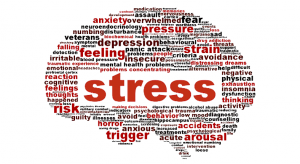Stress
Stress
Stress is a debilitating feeling you experience when you are under pressure. It is manifested by physiological, cognitive, behavioral, and emotional symptoms. Whenever you are exposed to a menacing situation, you undergo symptoms of strain. Kids, adults, students, professionals etc. experience stress without any bias. Tension levels in students have markedly increased in past couple of decades owing to inflating difficulty level of curriculum. Stress is not necessarily a negative phenomenon as it prompts you to get going instead of procrastinating. However, once it transcends a certain level, tension begins to squish your well-being. Therefore, the situation becomes not only suffocating but also intolerable and mounting strain impedes your performance on the task at hand.
Manifestation of Stress
When you face a threatening situation, your body takes to either fight or flight response activated by sympathetic nervous system. Thus, the manifest content of this response is known as stress. Thus, physiological as well as psychological symptoms arise to deal with the peril.
Physical Symptoms
Firstly, pressure becomes evident through physical symptoms that arise in response to averse situation.

- High blood pressure
- Rapid breathing
- Digestive system upsets (constipation, diarrhea, nausea)
- Tachycardia
- Muscles tense up
- State of alertness
- Insomnia
- Headache
- Low energy
- Low libido
- Fainting spells
- Low immunity
- Muscle aches
- Physical fatigue
Cognitive Symptoms
Secondly, tension manifests itself through cognitive symptoms.

- Anxiety
- Depression
- Sadness
- Emotional fatigue
- Memory problem
- Irritability
- Restlessness
- Depersonalization
- Derealisation
- Emotional exhaustion
- Burnout
- Attention deficits
Behavioral Symptoms
Thirdly, strain becomes apparent through overt behavioral symptoms.

- Crying spells
- Under-eating or over-eating
- Smoking
- Drinking
- Drug abuse
- Social seclusion
Ways to reduce stress
Anything that hinders your optimal performance should be seen to the exit door as early as possible. Clinical psychologists and other mental health professionals recommend various techniques to deal with stress.
Physical activity
Indulging in some physical activity not only diverts your attention from the stressing situation but also sublimes your risen energy positively.
Deep breathing
This technique is most recommended by professionals in the field of mental health. Firstly, inhale through your nose. Secondly, hold the breath for 3 seconds. Thirdly, exhale through your mouth. This is the most convenient technique and can be performed anywhere without the need of any apparatus. However, asthma patients are recommended not to exercise this technique due to their respiration risks.
Relaxation techniques
Relaxation techniques also efficaciously combat stress. Yoga, meditation, 16-muscle relaxation technique etc. can help reduce stress and ultimately achieve inner peace.
However, all techniques are not inevitable cures of stress for each individual. Different techniques are lucrative for different people. Therefore, it is concluded that stress is a detrimental phenomenon after crossing a certain limit. Thus, one should identify and deal with strain as soon as possible.
